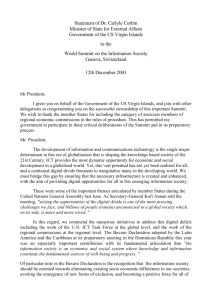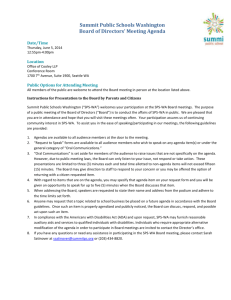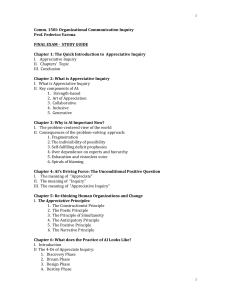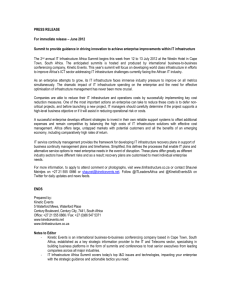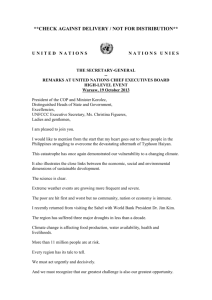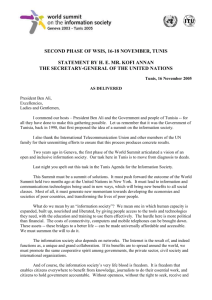Declaration After 2005 Summit - The Appreciative Inquiry Commons
advertisement
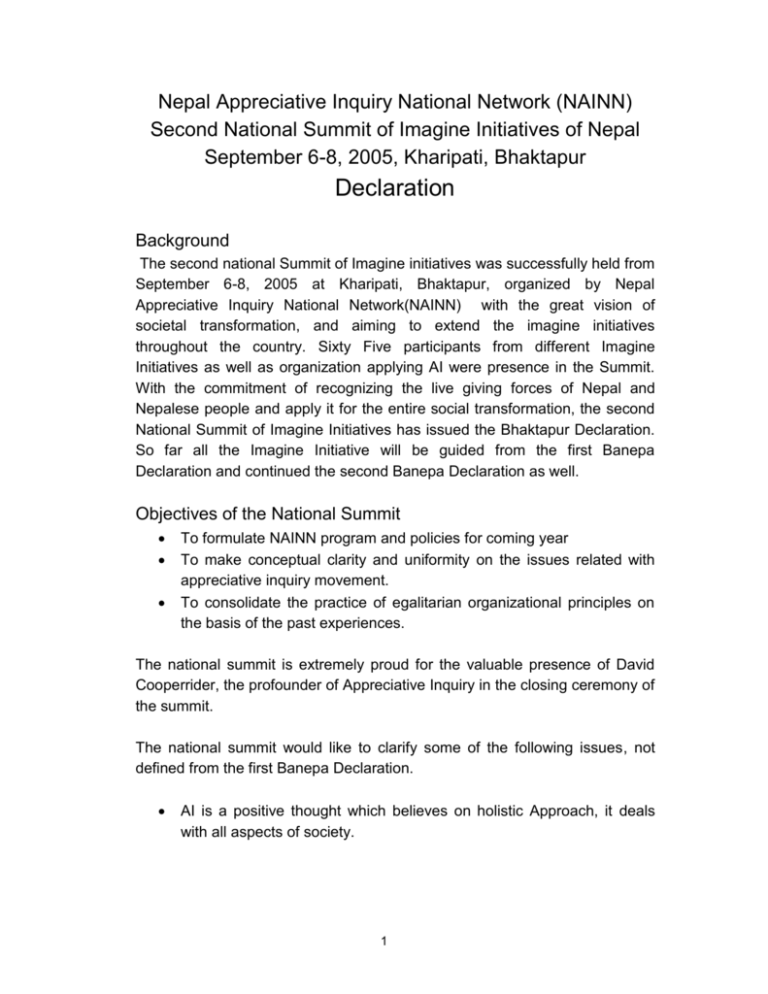
Nepal Appreciative Inquiry National Network (NAINN) Second National Summit of Imagine Initiatives of Nepal September 6-8, 2005, Kharipati, Bhaktapur Declaration Background The second national Summit of Imagine initiatives was successfully held from September 6-8, 2005 at Kharipati, Bhaktapur, organized by Nepal Appreciative Inquiry National Network(NAINN) with the great vision of societal transformation, and aiming to extend the imagine initiatives throughout the country. Sixty Five participants from different Imagine Initiatives as well as organization applying AI were presence in the Summit. With the commitment of recognizing the live giving forces of Nepal and Nepalese people and apply it for the entire social transformation, the second National Summit of Imagine Initiatives has issued the Bhaktapur Declaration. So far all the Imagine Initiative will be guided from the first Banepa Declaration and continued the second Banepa Declaration as well. Objectives of the National Summit To formulate NAINN program and policies for coming year To make conceptual clarity and uniformity on the issues related with appreciative inquiry movement. To consolidate the practice of egalitarian organizational principles on the basis of the past experiences. The national summit is extremely proud for the valuable presence of David Cooperrider, the profounder of Appreciative Inquiry in the closing ceremony of the summit. The national summit would like to clarify some of the following issues, not defined from the first Banepa Declaration. AI is a positive thought which believes on holistic Approach, it deals with all aspects of society. 1 Network believes that the indigenous knowledge, skill and technology are to be considered as the foundation for the societal transformation through appreciative inquiry. The valid source of appreciative inquiry are the people, place, ethnic group as well as all the social group or strata existing from the very beginning of the society. Some more social variable are defined as follows: A. Occupation Regarding the occupation, NAINN does not believe that there is no any demarcation in terms of value and contribution. Despite the diversities i.e. skilled, semi skilled, vocational or modern whatever, all occupations are dignified and respected in their own context. Moreover they are regarded autonomous as they have their own self center. B. Ethnicity In connection with the issue of ethnicity NAINN believes that community people living in minority, majority, and aboriginal, ethnic or vocational group whoever they have their own self center. They have their own right of protection, development and any kind of choices whatever they like; however there exists mutual understanding, interdependency and cooperation which have been leading the society towards betterment. C. Language and Culture Each and every language and culture followed by any group of people having difference in caste, ethnicity are regarded equally important. All these are enriched in their context. NAINN respects the cultural diversities which are the valuable assets of the nation. D. Belief and Religion Individual, family, group, community, cast, tribe, society and organizations all they could have their own religious and cultural beliefs. In deed, they have their own identities. They do not need to accept as their center to the others' religion, as they are self governed and self centered as well. They should be treated equally, also it is expected that there should be recognition and acceptance 2 among each other, which ultimately creates social harmony, peace and development. E. Gender Issue NAINN shows its' solidarity to the Nepalese women who are struggling against the gender discrimination caused by patriarchy and any other reason, aiming to achieve social justice and equity. The social transformation is only possible if male and female participate equally in the process. In the same way, male or female should not to be treated as superior or inferior. The differences in their respective situation are socially constructed but not because of by birth. In fact, male and female whoever they would have their own center. The relationship between them should be guided by the egalitarian principle. The interdependency and cooperation are to be taken as the major component for the societal transformation. F. Institutional and Organizational Relationship Apart from the Regional, Districts and other Imagine Initiatives, the organizations, networks working in the field of social and economic development, accepting the appreciative inquiry approach, they can be affiliated in district, regional and national level as well. In addition, there is always an opportunity of collaboration and partnership with different non governmental and governmental organizations working for social and economic development. Further clarity on some of the points mentioned in Banepa Declaration The regional Network is also supposed to be autonomous. They are the primarily responsible in coordinating all the Imagine Initiatives under that concerned region. The regional Network consists the representatives from the all imagine initiatives of that respective region, consequently the NAINN executives will be the members of Regional Network automatically. Summary In this way, the Second National Summit has given emphasized on the assumptions, principles and activities declared from the First National Summit. Moreover, it has incorporated some new definitions and made clarification on 3 some of the relevant issues. This declaration will be the guiding document up to the time next national summit. And lastly, It is to notify to all that that this is the authentic document to be followed by AI practitioner, facilitators and wishers whoever. Propositions 1. The summit acknowledges all the positive achievements seen in different area i.e. social, economic, cultural, political, also respects the new innovation, research and any kind of positive changes taking place in the society by the hard work of Nepalese people. 2. The summits hearty welcomes to the one sided cease fire declared by CPN (Maoist) and also urges to all stakeholders to be more serious regarding the restoration of peace in the country. 3. The summit strongly express its' support and solidarity to the civil society for their effort made for the restoration of socially inclusive democracy. 4. The summit urges all stakeholders to respect the fundamental human right to be serious and responsible in this regards. 5. The summit expresses its' solidarity towards the voice of social inclusiveness and appeal to all for the protection and cultivation of positive achievements. 4
